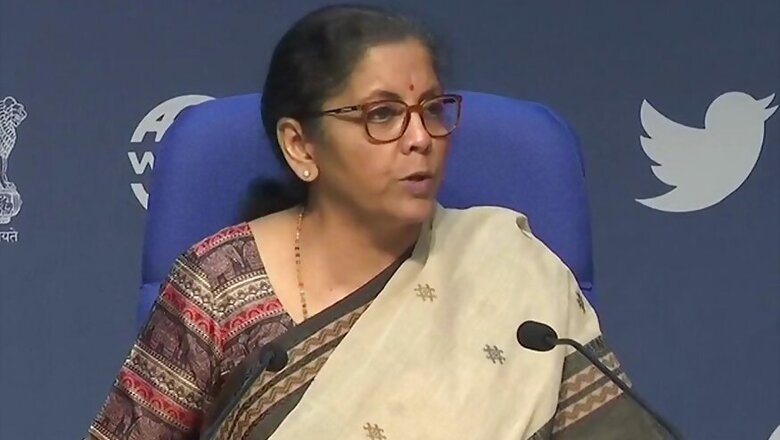
views
Finance Minister Nirmala Sitharaman and her junior minister Anurag Thakur have made a slew of big announcements that are going to impact farmers, fishermen and those involved in the field of animal husbandry. There has been much clamour about reform measures aimed at farmers and the Narendra Modi-led NDA government at the Centre has finally fulfilled this longstanding demand amid the coronavirus pandemic. These measures will improve the economic health of farmers in the long run and help them maximise their profits through new techniques and rules.
Finance Minister Niramala Sitharaman and her junior minister Anurag Thakur have made a slew of big announcements that are going to impact farmers, fishermen and those involved in the field of animal husbandry. The aims is to help farmers get the right price for their produce and aid them to sell their produce to anybody they wish to. The Essential Commodities Act has also been tweaked and it has ended the restrictions of stocking maximum quantity of produce such as food grains and oilseeds.
This will also help the inter-state trade of food grains without any hindrance. Not just this, farmers can now easily enter into deals with big food processing units, traders and exporters of their produce and take help from them regarding expenses they may incur on agriculture. In this arrangement, they will find readymade consumers beforehand and will be able to sell their produce to them on mutually agreed terms.
Experts keeping a close watch on the agriculture sector say these decisions of the government will bear fruits in the long run. They point out particularly the changes made to the Essential Commodities Act, the removal of the compulsions of selling produce through Agricultural Produce Marketing Committee (APMC) and giving free hand to farmers to enter into a deal with private sectors or to have any economic deal with them.
IIM-Ahmedabad Professor Satish Devdhar says it was extremely important to free farmers from the clutches of APMC. According to Devdhar, a small group of agents at APMC used to decide what price farmers would get for their produce. Farmers had no alternative. But in the new arrangement, they will be able to know the price of the produce in other markets of the country on their mobile phones in real time. In such a scenario, they may not be compelled to sell their produce to these agents on cheaper rates. They would now be able sell it in any market they wish, wherever they think they will get better prices.
In the same manner, the move to take out food grains, oilseeds and other farm produce from the purview of Essential Commodities Act is being hailed by experts. Professor Devdhar says this arrangement was made at a time when essential commodities were in short supply in the country and we used to get less produce. It was not the time of globalization, and government did not allow stocking of these items It was time when traders selling food grains were considered the biggest villains of the society, on the same lines that it has been showed in the film, Mother India. According to professor Devdhar, when a particular item is not produced and stockists and big agents stock that item in their warehouse, then the market economy tells us that the price of those commodities will not increase. Instead, it will decrease as it sends out the message that enough stock is available. Contrary to that, in the system that was followed till now, sometimes farmers had to throw their produce on the road, while on other occasion they hardly had any opportunity to make profit on a certain produce.
Experts also do not like the hue and cry that is raised every time about the Maximum Support Price. We all know that governments announce support price but if they are not able to purchase the whole quantity of produce, then what is the use of announcing this price. On the contrary, farmers keep on waiting that their produce will be procured, and by the time they come to know this is not going to happen, their produce is wasted and then they have to sell it on cheaper rates to any buyer they find around. To avoid that, it is better to allow farmers to have contract farming arrangements in advance so that they are assured of better price as, apple growers do in Himachal Pradesh. Since they have already entered into an arrangement and know what price they are going to get, whoever offers them better price is the one they sell the produce to. Experts believe that if government removes the bottlenecks in the supply chain, makes basic resources and technical platforms available to them, farmers will be able to help themselves.
Even the government thinks on the same lines and is putting much emphasis on creating basic infrastructure in the agriculture sector. Prime Minister Narendra Modi has been voicing this for a long time and his Principal Secretary, PK Mishra, knows it well. Mishra, who retired as agriculture secretary in 2008, had insisted on creating system that would help farmers get better price for their produce. That is why, be it the issue of creating necessary infrastructure to correct supply chain in the field of agriculture or creating facilities of storage before produce reaches in market, government has made the provision of one lakh crore rupees. Most rivers in the country are clean due to the coronavirus lockdown. In such a situation, a green cover of medicinal plants could be developed along the banks of Ganga if the Rs 4,000 crore allotted is utilised efficiently. This will help farmers immensely.
If the Prime Minister Fisheries Scheme is properly implemented, the lives of fishermen in the coastal region of India are going to change for better. The government has announced to spend ₹20,000 crore on this scheme. When Modi was the chief minister of Gujarat, he had started Sagarkhedu Scheme for the benefit of fishermen. Now, when he is the prime minister, the same scheme is going to be implemented on a larger scale for the welfare of all the fishermen across the country.
The government has also announced to provide ₹10,000 crore for micro food enterprises. This means that any famous eatable item in any city or district of the country will have now a chance to become global. In Bihar, for instance, the produce of makhana — grown chiefly in Mithila and Silanw Khaja — has every chance to make its presence felt in the global market if its taste can be improved and quality parameters and proper marketing techniques can be implemented.
As per the announcement made on Saturday, it is going to affect the animal husbandry sector directly. A national programme to control animal disease is being launched with a total outlay of ₹13,343 crore. As is natural, if an effective remedy is found for foot and mouth disease, this will directly benefit the farmers. For example, if this disease no longer affects cows and buffaloes, this may increase the quantity of milk they get from them which, in turn, will increase their income.
Many important announcements have also been made for the dairy industry. Apart from a plan for disease control, there is a move to create Animal Husbandry Infrastructure Development Fund. The Modi government has volunteered to provide ₹15,000 crore for it. The dairy industry can make use of this fund to increase its processing capacities. If this happens, it is going to affect the employment scenario and more and more people will get employment.
India is already a leading milk producer in the world and Gujrat Milk Marketing Cooperative Federation (JCMMF), which markets all the dairy products, is the largest organisation in the cooperative sector. RS Sodhi, MD of GCMMF, says if milk processing capacity in India increases, a huge number of employment could be created in the rural areas and this will be independent of agriculture sector. Sodhi says every one lakh litre of milk processing creates employment opportunities for around 6,000 people, out of which 5,000 such opportunities are created in rural areas while 1000 in urban areas.
Sodhi says with the help of this special fund, milk processing capacities could be increased exponentially and those who have reached their villages after losing employment due to the Covid-19 pandemic could be absorbed in this business. So, 30,000 people can readily be employed in the rural areas.
Finance Minister has given one more opportunity to the dairy sector. The government will bear the subsidy of 2 per cent of the loan that farmers in cooperative sectors will be charged. This means that if a milk cooperative organisation has taken loan at the rate of 7 per cent, they will have to pay only 5 per cent interest on that and 2 per cent interest will be borne by the government in this financial year.
This is being done to help farmers affected by the pandemic as the demand of milk has fallen 25 per cent. The government aims to provide this special support to farmers who have suffered losses due to this fall in the demand. This will put more than ₹5,000 crore in the hands of cooperative sectors and will, in turn, help around 2 crore farmers of the country who are associated with the milk cooperatives.
What’s interesting is that even during the lockdown, if you keep your supply chain in good shape and manage it properly, you can benefit a lot. The GCMMF has shown the way here as well. According to RS Sodhi, MD of this organisation, Amul has procured 35 lakh litres more milk during the 50 days of lockdown as people’s milk consumption has increased due to continuous staying at home. Due to this, GCMMF has procured an additional milk worth₹800 crores from the farmers and as a result, farmers have got ₹6,000 crore cash during this period in the form of the price for their milk.
These examples are enough to tell us that even if the struggle with like coronavirus is inevitable, a large section of rural economy may remain unaffected by it and farmers could make use of this for their benefits and can earn heavy profit. The special fund will not only increase the milk processing capacities, it will also lead to proliferation in factories that produce oil cake which will again benefit farmers as they will get more oil cake to feed their cows and buffaloes to get more milk.
Another very special announcement made by the Sitharaman was related to the bee-keeping industry. She has allocated around ₹500 crore for it. The plan is smaller compared to other schemes but will have a long-term effect. Most people link this scheme to producing honey only but it is much more than that.
Most people do not understand that bees play a major role in getting better produce of any crop, be it mustard, coconut, litchi, apple or even vegetables. These bees are responsible for the cross pollination in these crops which leads to better harvesting. That is why, famous scientist Albert Einstein once said that if honeybee is wiped off from the earth, the human civilisation would also vanish within five years.
This ₹500 crore scheme is going to benefit more than two lakh farmers of the country. Everybody knows that bees produce honey, but a few know there is other produce related to it that is sold on premium rates.
Chairman of Khadi and Village Industry Commission (KVIC), Vinay Kumar Saxena, is busy in promoting the bee-keeping industry for last two years. From Kupwara in Jammu and Kashmir to Bihar, he has been distributing honey bee boxes among farmers on a price 10 times cheaper than what they otherwise cost. He is selling them for just Rs 400 to farmers. According to Saxena, the honey that is produced from bees is sold for Rs 400 to 500 per kilo but the wax from their comb is sold for Rs 600 to 800 per kilo. This wax is used in beauty parlours. Not only this, the pollen that falls in the honey box is sold for Rs 1,200 to 1,300 per kilo.
The advantage of bee-keeping does not ends here. Roy Jelly fetches a rate equal to half of the rate of silver —₹20,000-25,000 per kilo. The biggest thing is, the rate of bee venom is ₹1 crore per kilo, double the price of gold. This substance is used in making anti-cancer medicines. Now, we know how precious beekeeping is. So it could be expected that these big ticket announcement made during the time of pandemic would bring joy on the faces of farmers and will make their lives sweeter than honey.




















Comments
0 comment